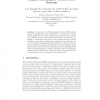Free Online Productivity Tools
i2Speak
i2Symbol
i2OCR
iTex2Img
iWeb2Print
iWeb2Shot
i2Type
iPdf2Split
iPdf2Merge
i2Bopomofo
i2Arabic
i2Style
i2Image
i2PDF
iLatex2Rtf
Sci2ools
181
click to vote
WAC
2005
Springer
2005
Springer
Adaptive Scheduling in Wireless Sensor Networks
Abstract. As the number of Wireless Sensor Networks (WSNs) applications is anticipated to grow substantially in coming years, new and radical strategies for effectively managing such networks will be needed. One possibility involves endowing the network with an autonomic capability to dynamically adapt itself to the prevailing network operating conditions, even while communications sessions are active. This may involve the network adapting itself either partially or completely. The approach suggested in this paper proposes that a suite of intelligent agents autonomously monitor the various network nodes and, depending on the status of certain parameters, actively intervene to alter the scheduling mechanism used, thus ensuring continuous operation and stability of the network together with an an improved performance yield.
Communications | Network Operating Conditions | Various Network Nodes | WAC 2005 | Wireless Sensor Networks |
Related Content
| Added | 28 Jun 2010 |
| Updated | 28 Jun 2010 |
| Type | Conference |
| Year | 2005 |
| Where | WAC |
| Authors | Antonio G. Ruzzelli, Michael J. O'Grady, Gregory M. P. O'Hare, Richard Tynan |
Comments (0)

